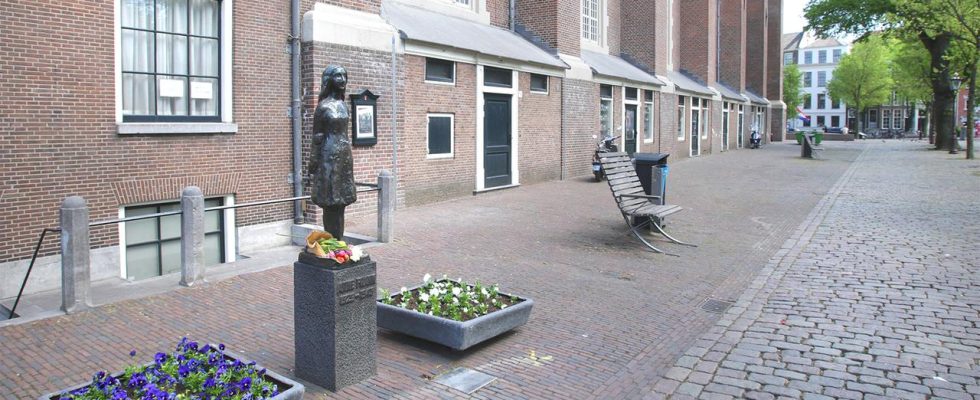europe magazine
Anti-Jewish football fans, hostility, attacks: anti-Semitism is increasing in the Netherlands. Putting the Holocaust into perspective is socially acceptable again, especially among younger people. What is it and what can be done about it?
Prinsengracht 263 in Amsterdam is an address that almost everyone in the Netherlands knows. Because it is the house in which Anne Frank hid with her family from the Nazi persecution of the Jews between 1942 and 1944 and wrote her famous diary. Today the house is a memorial, and thousands of visitors from all over the world come every day.
Every third Dutchman has also been here, often as part of school lessons. And that leaves an impression. A young woman says she was there with a survivor of the war. The personal dimension touched her. Another adds: Here you can learn what happened back then – and should never happen again.
The long lines in front of the Anne Frank Museum cannot hide the fact that a significant number of Dutch people put the Holocaust into perspective.
Twelve percent doubt that historiography
There are other voices, however. A young man walking in front of the museum admits: he has never been there and it doesn’t really interest him. After all, you’ve already learned everything about the subject in school. Actually, too much is said about the Holocaust for him.
The Netherlands now have it in black and white that the younger generations are not exactly at their best when it comes to knowledge about the Holocaust. Earlier this year, a study by the Jewish Claims Conference shook the country. For this, people in different countries were asked about their relationship to history.
Twelve percent of the Dutch responded that they doubted the official history. But there were significantly more among those under 40: According to the study, almost a quarter put the Holocaust into perspective. These are the highest values that have ever been measured in the Netherlands.
The canon of values is fading
There was also a lot of criticism of the survey methodology, but not of the numbers. They coincide with the findings of the Dutch government. This is dramatic for the country’s self-image. For a long time, the Netherlands believed that they were particularly exemplary in coming to terms with the past. There is no shortage of commemoration days, the topic is compulsory in schools. Nevertheless, it seems that only a few young people are reached.
Eddo Verdoner believes that this is also due to social media. The national anti-Semitism commissioner of the Netherlands says: People are moving more and more in bubbles, are being presented with alternative realities. In addition, society is becoming more and more polarized and the time of National Socialism is moving more and more into the past. “All of this means that our social canon of values is fading,” says Verdoner. And this makes the population more receptive to conspiracy theories.
This applies not only in the Netherlands, but throughout Europe. The study by the Jewish Claims Conference shows that elsewhere, too, it is primarily the younger generations who are increasingly casting doubt on the Holocaust.
The result is that anti-Semitic thought patterns are spreading again. This is observed by the European Agency for Fundamental Rights. She regularly asks 16,000 Jews across Europe how they perceive their everyday lives. The results are terrifying.
Giving the victims a name: In Amsterdam, a memorial commemorates the Jews and Sinti and Roma who were arrested, deported and murdered by the German Nazi occupiers.
“Then modern Europe no longer makes sense”
90 percent of those surveyed recently stated that increasing anti-Semitism was worrying them. A good third had experienced discrimination themselves. According to the EU agency, these trends have been intensifying for years. A current edition of the study is in progress. Unfortunately, he does not expect a positive turn, according to the head of the EU agency Michael O’Flaherty.
What particularly shocks him: 38 percent of the Jews surveyed are considering emigrating, especially to Israel or the USA. That shouldn’t happen. If Europe drives out its Jewish population, it will be more than a cultural loss. “Then modern Europe will become meaningless,” said the EU official. After all, the European project builds on the experiences of the Holocaust.
So what to do? The EU agency recommends a new approach to teaching history. Since there are hardly any survivors left who can report on their experiences, there must be new ways of making history personally tangible. They also take that to heart in the Netherlands. The anti-Semitism commissioner from Verdon recommends a three-stage strategy.
Make Jewish life more visible
On the one hand, Jewish life would have to become more visible in order to take away the fear of it. This includes teaching Jewish customs better. Second, decisive action must be taken against anti-Semitism, for example in football stadiums. And thirdly, there is a need for new offers in the classroom. About digital formats, but also direct proximity.
For example, Verdoner envisions a database for schools that they can use to find memorial sites near them. “So that people can see: all of this happened in my town, in my village.” That helps to understand and is effective against conspiracy theories.
A path they also take in the Anne Frank House. There they are experimenting with new teaching methods, Anne Frank’s diary is now available on Instagram, for example. According to the museum team, the most important thing remains a personal visit on site. When school classes climb the stairs of the rear building and step through the hidden door into the hiding place where eight Jewish fates took place – then for many visitors it straightens their picture of history.
You can see this and other reports in Europamagazin – on Sunday at 12.45 p.m. in the first.

